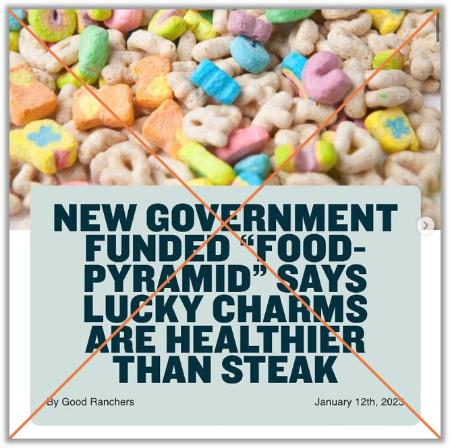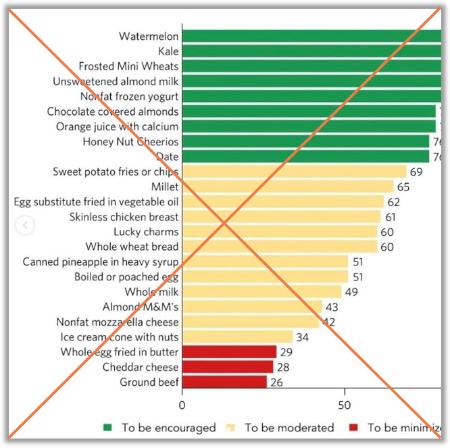
Joe Rogan misleads on 'government-funded food pyramid'
- This article is more than three years old.
- Published on January 30, 2023 at 21:07
- Updated on January 30, 2023 at 22:05
- 3 min read
- By Natalie WADE, AFP USA
"NEW GOVERNMENT FUNDED 'FOOD-PYRAMID' SAYS LUCKY CHARMS ARE HEALTHIER THAN STEAK," Rogan said in a January 14, 2023 Instagram post that received more than 925,000 likes.
Rogan hosts "The Joe Rogan Experience," the most popular podcast on Spotify. In 2022, he came under fire for casting doubt on the safety of Covid-19 vaccines, leading some artists to pull their music from the streaming platform.


Meat delivery service Good Ranchers first published the claim on its website. It then circulated on multiple social media platforms, including Facebook, Twitter and TikTok.
The posts reference a 2022 research paper that highlights the limitations of data from Food Compass, a nutritional metric system that Tufts University unveiled in 2021 with support from the National Heart, Lung and Blood Institute (NHLBI), part of the National Institutes of Health (NIH). Food Compass uses nine characteristics to rank foods on a scale of one to 100, with the latter being the healthiest.
The paper includes the chart shared online. However, the research goal was to point out Food Compass's inconsistencies -- not to create definitive rankings.
"Many of the posts (including Joe Rogan’s) are not accurate representations, although they do contain some truth," said Ty Beal, a nutrition scientist and the paper's corresponding author, in a January 26 email. "My co-authors and I used the figure to show examples of questionable ratings and what we consider to be flaws in the system."
Lucky Charms, for example, ranked near the middle of the chart as food "to be moderated," while ground beef, meanwhile, appeared near the bottom as something "to be minimized."
However, Beal said the chart "was not created by the authors of the Food Compass paper or the government." And the food pyramid is something else entirely.
Did this study create a new Food Pyramid? pic.twitter.com/jjeUL0yV9X
— Ty Beal (@TyRBeal) January 15, 2023
Created in 1992, the USDA visual gave Americans recommendations for how much they should eat from five major food groups. MyPlate, another nutrition guide, replaced the food pyramid in 2011.
Beal tweeted that, despite the researchers' criticism, Food Compass is "a decent system and would improve upon the current US diet."
Here's a fairer example of Food Compass which clearly shows it is a decent system and would improve upon the current US diet. It would promote consumption of fruits, vegetables, legumes, nuts, seeds, whole grains, seafood, and yogurt, and limit consumption of junk foods. pic.twitter.com/XsVWBvFTNf
— Ty Beal (@TyRBeal) January 14, 2023
The Tufts project addressed the controversy on its website, saying: "Food Compass works very well, on average, across thousands of food and beverage products. But, when this number and diversity of products are scored, there are always some exceptions."
The project added that the chart shared online was "created by others to show these exceptions, rather than to show the overall performance of Food Compass."
While it is unclear why exactly Lucky Charms is rated higher than ground beef in the chart shared online, the research paper says Food Compass tends to "underestimate the risks associated with ultra-processed foods." The system considers both healthy and unhealthy aspects of different foods to create a score.
Breakfast cereal, for example, is high in sugar but contains many vitamins and minerals -- and while ground beef is high in protein, it also has a considerable amount of saturated fat. There is some debate among nutritionists about whether sugar or saturated fat is worse for health, but experts say both should be limited to reduce the risk of heart disease.
"We recognize that Food Compass is not perfect. It’s better than what exists today, and can be further improved," Dariush Mozaffarian, a nutrition professor at Tufts, told AFP in a January 27 email. "We have not 'released' Food Compass for immediate implementation. It is research in progress, and we continue to refine and update it."
The NHLBI told AFP in a January 27 email that Food Compass "is not a new food pyramid," adding that the NIH does not have any plans to incorporate the system in new policies.
Copyright © AFP 2017-2026. Any commercial use of this content requires a subscription. Click here to find out more.
Is there content that you would like AFP to fact-check? Get in touch.
Contact us
